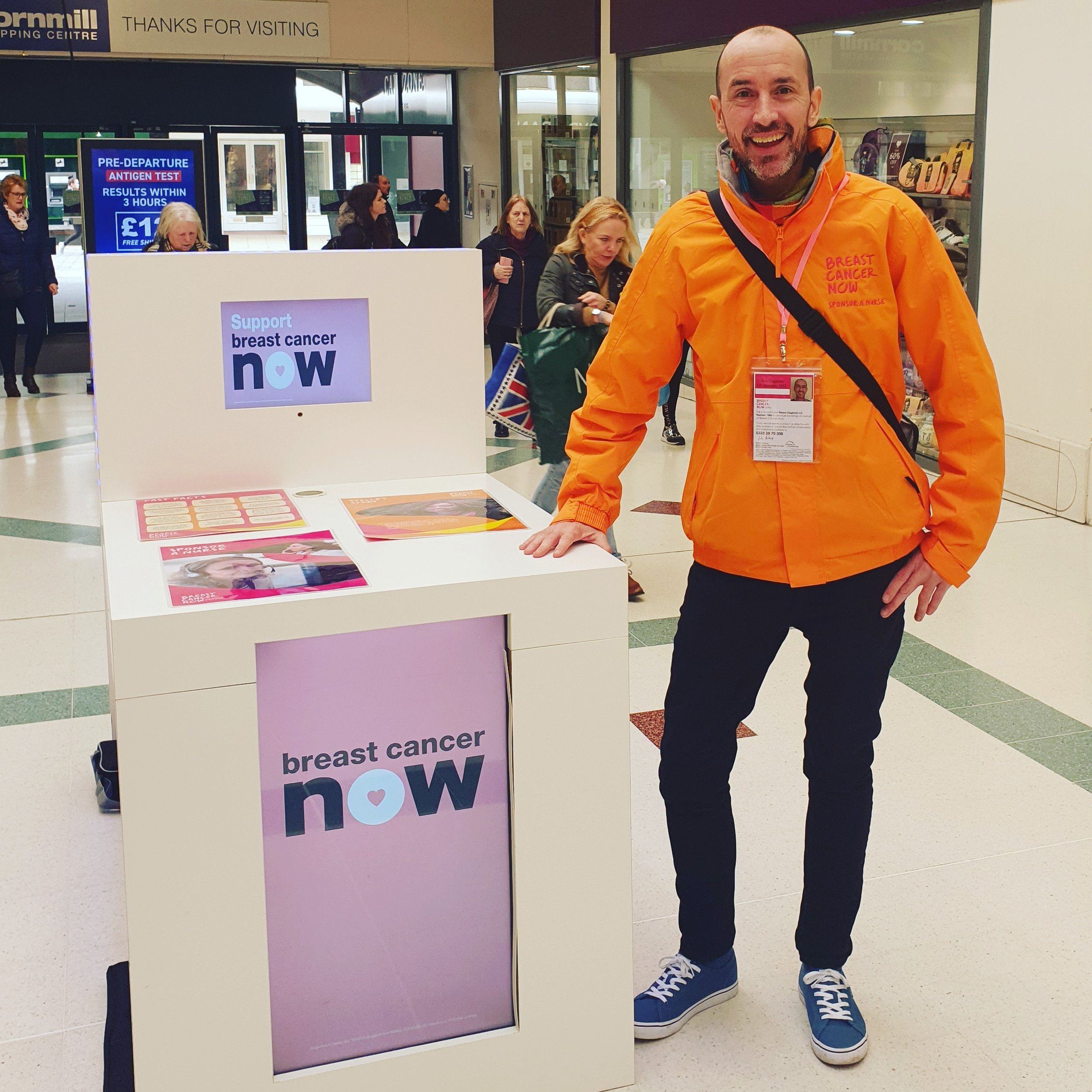Fundraising jobs; it’s not something you do, it’s someone you ARE
How many of us assume charity fundraising jobs consist of standing on high streets shaking tins and buckets at people? Or think of fundraisers as doing all sorts of attention seeking things from the amusing to the outrageous to the inspiring? But what about the employed type of fundraiser? Is fundraising a good job?
Contents
It’s fair to say that face to face fundraising stopped being a ‘throw away’ job a long time ago. These days, professional fundraising requires skills and traits that go well beyond ‘shaking tin’ abilities. The good news is, the rules and expertise of a good fundraiser can be taught and improved upon.
The skills gained from a fundraising job show professional fundraisers are an innovative, skilled and tactical army of change makers.
For charities and causes, they offer the financial lifeline that can be the difference between surviving and thriving.
But what is the charity fundraising job description?
How does each fundraising role differ?
Is the corporate fundraiser basically the same job as those working in charity street fundraising jobs?
The characteristics you need for a career in fundraising
One of the things that fundraisers say time and again is that they love doing a job that makes a difference - to be able to help.
Having a kind heart is a great starting point, but there’s also certain personality traits that are essential to be a successful fundraiser.
Here’s just a few:
Confidence
Approaching strangers to ask them for money is a fundamental part of being a fundraiser, so confidence is a must!
Communication skills
Once you’ve approached a potential donor, you have a tiny window of time to make a connection, which means your communication skills must be excellent.
A face to face fundraiser must be able to gain trust quickly and educate without preaching.
They should be friendly, assertive and articulate, keeping their pitch interesting and personable.
Being succinct is vital, so you can get your message across correctly and clearly (sometimes in just a couple of minutes).
Enthusiasm
Another trait that can’t be taught is enthusiasm.
Although believing in the cause is important (because it’s the fuel for passion), the reality is that others probably won’t be as inspired or enthused as you are.
That means the fundraisers enthusiasm has to be enough to carry both.
If you’re enthusiastic, you’ll bring an infectious energy to the table that others will be drawn to.
Enthusiasm can also be the energy to carry you through the toughest days.
Salesmanship
Sales are an integral part of fundraising, but the truth is a fundraiser isn’t the typical salesperson. They’re not really ‘selling’ any thing - there’s no product or service on offer here.
Instead, fundraisers are offering a ‘feeling’ - that is a feeling of having done something kind for others without it benefitting the giver personally at all.
And selling a feeling takes real skill!
You need knowledge to illustrate how your cause is different and to explain how change can be made.
Facts and stories help draw on the listeners compassion.
Fundraisers must educate and inspire the donor so they not only understand, but believe their actions will make a difference… enough even to keep giving into the future.
Building a relationship with someone else within a short time frame requires the ultimate awareness and precision.
Salesmanship needs a combination of great communication skills, a pinch of charm and some gentle persuasion, all while NEVER being pushy or manipulative.
Intuition
Fundraisers tread a fine line between knowing when to handle an objection and not spending precious energy on someone who won't be a donor.
This takes experience, but a bit of intuition too.
Read about objection handling like a boss
Resilience
Resilience is a biggy. Fundraisers are told no – a LOT.
In fact, it’s fair to say fundraisers probably get told no more than almost any other profession.
That said, a single yes can be all it takes to give fresh motivation... Because if you find one ‘yes person’ there must be more right?
As well as resilience, a bit of stubbornness and tenacity go far - because fundraisers need to refuse to give up no matter what!
Read about how to be a fundraiser with super human resilience
Is fundraising a good career?
Fundraising is a unique and worthy job.
Your reward isn’t necessarily always a tangible thing.
Truly successful and happy fundraising goes beyond money (although good fundraisers can earn in excess of £45,000 per year which is not be sniffed at).
One of the biggest rewards of the job has to be knowing that you have directly contributed to changing something for the better.
The donations you have solicited mean that somewhere, a life experiencing hardship will be easier.
Because of you, someone is happier, more well, supported or might even have had their life saved.
And that’s priceless.
What different types of fundraising jobs are there?
Of course, the overall objective is the same for any type of fundraiser: to connect with those who wish to make a difference to causes and entice them into acting upon that desire.
Charity Link are private site and door to door fundraising agency, which are both types of face to face fundraising.
Compared to street fundraising (which brings in around 100 thousand donors per year), door to door and private sites bring in around 600-700 thousand donors.
So you can see we’ve chosen our fundraising methods!
Our venues team work tirelessly to secure the very best places and events across the country so our fundraisers have the very best chance of success.
You can read more about the venues team operate here
Whilst at the venues, or whilst knocking doors, Charity Link fundraisers ask the public for funds on behalf of our charity partners.
Our clients are some of the UKs best loved charities and they know we can deliver beyond what they might be able to do internally.
This is not only because of how we secure the best venues, or that we offer specialist training and mentoring, or that we’re laser focused on constant innovation and improvement to get the best results.
It’s because we work together as a whole team to support our fundraisers and charities, from our Field support teams to our passionate in-house recruitment team to our caring client services team.
We enable our charities to get back to doing what they do best; helping their beneficiaries.
“As a fundraiser you’re essentially connecting those who wish to make a difference with causes they care about.”
The fundraising skills you obtain from this experience are not only life enhancing, they can also lead to other fundraising career opportunities down the road.
Corporate fundraising
Corporate fundraising is the kind of middle man fundraiser acting as a go-between for a charity and a business.
Through business donations, charities get the much needed cash injection while businesses get tax relief, a great reputation and the feel good factor.
The corporate fundraiser must first identify and ally with key decision makers. Their aim is to monetise any existing corporate social responsibility strategies, or better still, help to create them.
Being able to inspire people is definitely a part of the corporate fundraising job.
Relationship building, presenting proposals and generally being their port of call for all charity related queries takes a particular knowledge of how business works.
It goes without saying that businesses respond well to figures and forecasts, so inviting them to see the impact of their financial aid, whilst helping them to see how it can benefit their public image all helps.
Businesses use their charitable relationships to present a positive brand image or even to unify employees. Schemes that offer the option to auto-donate on pay day are commonplace with announcements on the collective results for positive motivation.
Fundraising event management
Fundraising for events and charity event jobs require the need to wear many different hats (almost literally!). Events involve anything from venue searching, marketing and PR to logistics and sales for your charity events.
A creative brain will always work well in the fundraising events arena, with the need for constant fresh ideas to promote and reach that target. Black tie gala dinners, marathons, sky dives, baked bean baths, head shaves, sponsored cake making or basically anything you can think of can work for the charity event - the world is your oyster!
Trust fundraising
Trust fundraising offers the highest return on investments of all the type of fundraising.
According to the Institute of Fundraising’s 2013 ‘fund ratio’ statistics, for every £1 invested, there was an average return of £9.56!
So how does it work?
Large charitable trusts and foundations issue ‘grants’ to worthy causes which don’t have to be paid back, making them the ‘golden snitch’ of charity donations.
The trust fundraiser role needs a methodical approach and involves extensive research to find the biggest need to measure the impact of potential donations against.
Essentially what the trust fundraiser is looking for is the best ‘bang for buck’.
This type of fundraiser need a keen eye for detail, the ability to consolidate information and excellent relationship building and presentation skills.
Telephone fundraising jobs
Telefundraising was pretty impactful at its peak and includes fond memories of volunteers alongside celebrities taking Red Nose Day or ChildLine donations by phone.
Of course the day to day job is a little less exciting, basically making relentless telephone calls using a script to entice people to donate.
Since the introduction of GDPR in 2018, things have become increasingly difficult for telesales across the board.
Fundraisers can no longer legally phone someone unless they’ve opted in to being called for marketing purposes. And let’s face it, people seldom do give permission voluntarily these days. Smartphones are also able to detect a ‘nuisance call’ before a person even picks up, making it all the more difficult.
Given the low return on investment and the number of things that could be called into question about whether it’s compliant in fundraising means telephone fundraising is likely headed for the scrap pile.
Online fundraising ideas
Online fundraising ideas mean digital campaigns on charity website, social media and advertising on search engines or publishing platforms.
If you’re more technically gifted, then fundraising online could be your calling.
This type of fundraising is usually found in house within a charity organisation rather than a marketing agency to minimise costs.
Legacy fundraising
Legacy fundraisers try to persuade people to include a charity in their will when they die.
To raise awareness, this typically means the more traditional marketing styles like leaflet dropping and adverts in well-chosen local rags, although as digital marketing strategies and DRTV (direct response television) are also used.
Private giving
The final option for a fundraising career is to work with the super wealthy who want to help causes but aren’t sure about the best place to direct their money.
Philanthropy works by providing large amounts of money to charitable causes and is particularly advantageous since it has fewer constraints than some other forms of income.
Much like trust fundraising, private giving requires lots of research and networking, with fundraisers building relationships with potential donors as ‘partners and peers’ showing mutual respect.
A survey by philanthropy group ‘The Beacon Collaborative’ and the Institute of Fundraising questioned over a thousand wealthy individuals from the UK. The responses to the survey showed three key findings:
A sense of belonging and shared purpose, along with a drive to achieve positive change, motivates many wealthy individuals
Fundraisers should carry on focusing entry-level giving, welcoming new donors to the table and aiming to build trust from there
A realisation that wealthy people are not all the same. Meeting the needs of different groups with donor segmentation will be a powerful tool
Why don’t charities just use their own fundraisers?
As the world of fundraising gets more sophisticated and more competitive, it makes sense to bring in experts who deliver on goals with efficiency and compliance.
Although charities are used to being innovative about inspiring donations, as a single act, this just isn’t enough. The spare change thrown in a bucket doesn’t pay the bills, nor does it give the consistency that’s needed to plan ahead.
Charities often have specific campaigns that their marketing teams invest much expertise into. Examples of fundraising campaigns include things like the Dogs Trust’s ‘sponsor a dog’ or Breast Cancer Now’s ‘sponsor a nurse’
But even the best campaigns need the magic ingredient of face to face persuasion to truly make it real to the potential donor.
And so the penny has well and truly dropped for a lot of charities.
The need for real results, with fundraisers who will uphold their good reputation is worth a lot, which is why they’re flocking towards the face to face fundraising that clearly gets the best results.
Although fundraising can be employed in-house, a professional fundraising agency is the best way to go. Not just because they’re the experts at maximising the potential that fundraising has, but also because it removes the hassle and risk of employing and training staff themselves.
Even more tempting is the knowledge that they only pay the professional fundraising organisations (PFOs) based on performance.
Learn more about why charities are investing in professional fundraising agencies
Understanding how crucial those regular donors are to charity is part way to realising how special the face to face fundraiser job is. Basically, you’re targeting smaller amounts from a much wider pool than trying to get the elusive single large donation from the local millionaire.
What’s it like being a fundraiser?
Deciding on a career path is sometimes more about luck and judgement and this is certainly the case for fundraising. It’s not exactly what children say they want to grow up to be!
But while there are a dozen reasons for working in any job, one standout reason for fundraising is the desire to make a difference.
Fundraisers jobs are not really akin to a ‘normal’ job, it’s almost a lifestyle choice, a ‘calling’ even.
The hours can be off kilter, the travel can be taxing and the morale can take a good beating. But the dedication must remain steady.
Like anything, practice makes perfect, so we often find that full time fundraisers master the role a little quicker than those in part time fundraiser jobs.
The seasoned fundraiser must be able to anticipate all the objections and handle them accordingly. They learn exactly when to show patience, when to persevere, and when to pleasantly leave it there.
The fundraiser must move with the times and become savvier, more ethical and more resilient.
There are nearly 170,000 charities in the UK alone, all competing for money and all under immense pressure to give more, do more and be more.
And while the media have spent much energy to discrediting professional fundraisers, fundraising agencies and charities (“shouldn’t we all be volunteer fundraisers for free?”) they soldier on, proving them wrong and working ever harder with tighter regulations.
Fundraisers accept that their skills and talents could be used in other sectors, but for the love of ‘fighting the good fight’ they just keep going!
Don’t forget, you can listen to this blog as a podcast in the below!
A day in the life of a fundraiser at Charity Link
Door to door fundraising
Known at Charity Link as ‘Home to Home’ or ‘H2H’, these fundraisers typically work between midday and 8pm, which maximises the times when people are at home and less busy.
Since the Covid pandemic there’s a huge increase in people working from home, which has boosted potential for H2H fundraisers.
Every day the fundraiser receives information about which location they’ll cover, along with advice on which route to follow.
Potentially a fundraiser can knock up to 120 doors per day, providing plenty of opportunity to sign up new donors.
Most of the time, door to door fundraisers will work independently, but a team manager is always on hand for support, advice and door to door fundraising tips.
Private site fundraising
Full time private site fundraisers usually work between 10am and 6pm over 5 days.
Shifts aim to cover the busiest times in order to get in front of as many people as possible. That means our full time private site fundraisers also work alternate weekends.
Early morning, lunchtime and late afternoon tend to be best for private site fundraisers, but over time we notice patterns of activity for particular venues.
Flexibility is important in this role so you can adapt to the footfall of the venue being worked. Sometimes this means shifts need to be tweaked in order to meet targets. Part time fundraisers do three or four full days, while full time fundraisers work a 40 hour week.
What do Charity Link look for when hiring fundraisers?
Charity Link doesn’t require a specific academic background, because we’re looking for personality.
If a candidate shows passion, confidence, people skills, professionalism and resilience we’ll always explore further.
As well as the characteristics we talked about earlier, it’s important to be organised, have self-belief and be self-motivated because much of the job relies upon that.
Showing willing and reliability goes a long way to securing a fundraising job.
Do you think you could help a worthy cause to raise money?
It’s been proven that without fundraisers, the charity sector simply could not survive.
If you want a career that challenges you, rewards you and inspires you and you think the skills gained from fundraising sound great, then maybe fundraising is your calling?
Apply to our inhouse recruitment team and see where it could take you!
One thing’s for sure – you’ll be working hard, but the rewards will be rich.













